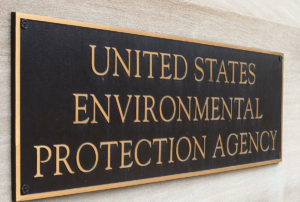 The Environmental Protection Agency Thursday announced the denial of 36 small refinery exemptions (SRE) for the 2018 compliance year. The petitions were remanded to EPA by the U.S. Court of Appeals.
The Environmental Protection Agency Thursday announced the denial of 36 small refinery exemptions (SRE) for the 2018 compliance year. The petitions were remanded to EPA by the U.S. Court of Appeals.
At the same time, EPA announced an “alternate compliance approach” that allows 31 of those small refineries to meet their new 2018 compliance obligations “without purchasing or redeeming additional RFS credits.”
Pro-biofuel organizations are disappointed with the novel approach being taken by the agency.
“While today’s decision is an important step in reversing past abuse of refinery exemptions, the decision fails to remedy the economic harms the improperly granted 2018 SREs have already caused,” said a joint statement from the Renewable Fuels Association, Growth Energy, National Corn Growers Association, Clean Fuels Alliance America, American Coalition for Ethanol, and National Farmers Union.
“EPA’s readiness to excuse individual refineries from their obligations to comply with 2018 blending requirements comes at the expense of our biofuels producers, farmers, and American consumers.”
Biofuel and farm advocates had challenged the exemptions in the D.C. Circuit Court of Appeals, forcing the agency to reevaluate its approval for select oil refiners to avoid their obligations under the Renewable Fuel Standard (RFS). Last August, when EPA filed a motion to remand the SREs without vacatur, the D.C. Circuit remanded the exemptions back to EPA, but required the agency to make new determinations on the contested SREs no later than April 7, 2022.


 Two years ago ethanol producers were in the middle of the worst downturn in the industry’s history as the new COVID-19 pandemic put the country at a standstill and production dropped by 50 percent in a month. Under the CARES Act, $700 million was approved to help make up for those losses to producers, but that money has yet to be distributed.
Two years ago ethanol producers were in the middle of the worst downturn in the industry’s history as the new COVID-19 pandemic put the country at a standstill and production dropped by 50 percent in a month. Under the CARES Act, $700 million was approved to help make up for those losses to producers, but that money has yet to be distributed.  Environmental Protection Agency (EPA) Administrator Michael Regan appeared before the
Environmental Protection Agency (EPA) Administrator Michael Regan appeared before the 
 Sales of E15 (15% ethanol fuel) hit a record 814 million gallons in 2021, according to a new
Sales of E15 (15% ethanol fuel) hit a record 814 million gallons in 2021, according to a new  Snap a photo of lower-priced, higher-ethanol blends at the pump could get you some free fuel.
Snap a photo of lower-priced, higher-ethanol blends at the pump could get you some free fuel.  Sen. Chuck Grassley (R-IA) gave hope to the ethanol industry that sales of 15% ethanol blends may yet be able to continue in the summer months despite last year’s devastating court ruling.
Sen. Chuck Grassley (R-IA) gave hope to the ethanol industry that sales of 15% ethanol blends may yet be able to continue in the summer months despite last year’s devastating court ruling.  The
The  Ethanol organizations submitting feedback to the the Environmental Protection Agency’s (EPA) request for comment on the current scientific understanding of greenhouse gas (GHG) are asking for an update.
Ethanol organizations submitting feedback to the the Environmental Protection Agency’s (EPA) request for comment on the current scientific understanding of greenhouse gas (GHG) are asking for an update.  Sales of E85 (85 percent ethanol blended fuel) are soaring to new heights in California as drivers of flex fuel vehicles are finding out they can pay a lot less for a fill up.
Sales of E85 (85 percent ethanol blended fuel) are soaring to new heights in California as drivers of flex fuel vehicles are finding out they can pay a lot less for a fill up.